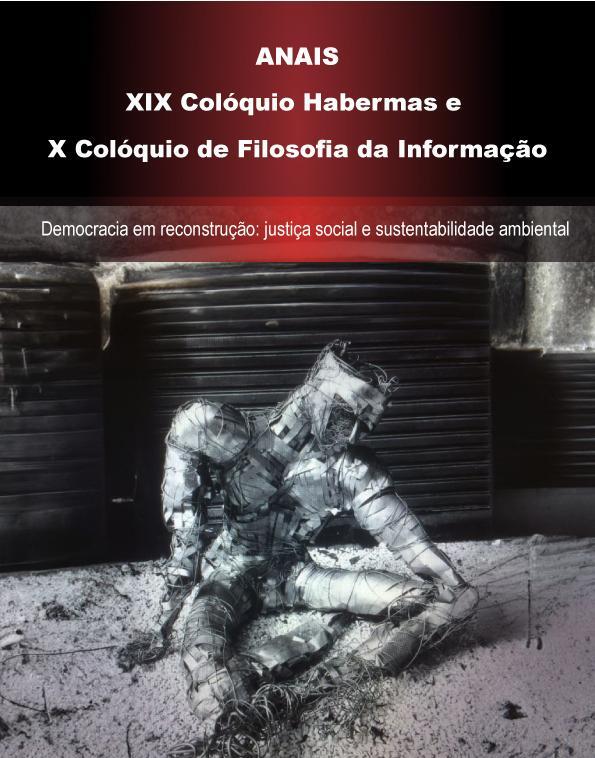The Habermas Colloquia in the light of the information regime
DOI:
https://doi.org/10.21728/logeion.2023v10nesp2.p563-582Keywords:
Habermas Colloquium, Information regime, Scientific communication, information ScienceAbstract
Shares results of exploratory research to apply the information regime model to the set of 14 editions of the Annals of the Habermas Colloquium, a scientific communication event in the area of Information Science. This is descriptive and documentary research, supported by the indexical method (Ginzburg) and the brauseio technique (Araújo), carried out in the archives of the Annals of Colóquios in the period from 2009 to 2022. It adopts the information regime approach from the perspective of González de Gómez, presenting its elements — social actors, actions, devices and information artifacts — in the context of the scientific community's way of life. It describes the interactions between the elements of the information regime of the Habermas Colloquium, from the creation, by social actors, of an information value (semantic-pragmatic stratum) to the conformation of rules into devices (meta-informational stratum) and the sharing of results through digital artifacts (information infrastructures). Four groups of social actors were identified among the participants of the Habermas Colloquia: (a) those who participated from the beginning; (b) those who started participating in the middle of the historical series; (c) those who recently started participating, maintaining regular participation; and (d) those who participated only once. In a preliminary analysis, it is understood that through the holding of Colloquia and the publication of the Annals, the results of scientific research were shared and discussed by a qualified community, enabling the creation of new knowledge in Information Science.
Downloads
References
ARAÚJO, V. M. R. H. de. Sistemas de recuperação da informação: nova abordagem teórico conceitual. 1994. Tese (Dout. em Com.) – Faculdade de Comunicação, Centro de Filosofia e Ciências Humanas, UFRJ. Rio de Janeiro, 1994.
ARBOIT, A. E.; BUFREM, L. S. Produção de trabalhos científicos em eventos nacionais da área de ciência da informação Transinformação, Campinas, v.23, n.3, p.207-217, set./dez., 2011 DOI: https://doi.org/10.1590/S0103-37862011000300003
BOURDIEU, P. O Campo Científico. In: ORTIZ, R. Pierre Bourdieu – Coleção Grandes Cientistas Sociais. São Paulo: Editora Ática, 1983.
COLÓQUIO HABERMAS. Espaço de discussão do pensamento de Jürgen Habermas. Disponível em: https://coloquiohabermas.wordpress.com/.
FREIRE, I. M. A perspectiva do valor de informação: aplicação teórica no laboratório de tecnologias intelectuais. Revista Conhecimento em Ação, v. 5, n. 2, p. 182-203, 2020. DOI: 10.47681/rca.v5i2.39368. DOI: https://doi.org/10.47681/rca.v5i2.39368
FREIRE, I. M. Mediação da informação: um olhar sobre o portal LTi a partir literatura indexada na Brapci. Informação & Informação, Londrina, v. 19, n. 2, p. 23-45, maio/ago. 2014. DOI: https://doi.org/10.5433/1981-8920.2014v19n2p23
FREIRE, I. M.; FREIRE, G. H. de A. No coração da ciência. In: FREIRE, G. H. de A.; FREIRE. I. M. (Org.). Comunicação científica em rede. Rio de Janeiro: IBICT, 2022.
GARVEY, W. D. Communication: the essence of science. Oxford: Pergamon, 1979.
GINZBURG, C. Mitos, emblemas, sinais: morfologia e história. São Paulo: Cia. Letras, 1989.
GONZÁLEZ DE GÓMEZ, M. N. Escopo e abrangência da Ciência da Informação e a Pós-Graduação na área: anotações para uma reflexão. Transinformação, v.15, n.1, p.31-43, 2003. DOI: https://doi.org/10.1590/S0103-37862003000100002
GONZÁLEZ DE GÓMEZ, M. N. O caráter seletivo das ações de informação. Informare, v.15, n.2, p. 7-31, 1999.
GRIFFITH, B. C. Understanding science; studies of communication and information.
Communication Research, Newbury Park, v. 16, n. 5, p. 600-614, Oct. 1989. DOI: https://doi.org/10.1177/009365089016005003
MEADOWS, A. J. A comunicação científica. Trad. Antonio Agenor Briquet de Lemos. Brasília: Briquet de Lemos, 1999.
MENZEL, H. The flow of information among scientists - problems, opportunities, and research questions. New York: Columbia University, Bureau of Applied Social Research, 1958.
MERTON, R. K. Behavior patterns of scientists. American Scholar, v. 38, p. 197-225, 1969.
POBLACION, D. Literatura cinzenta ou não convencional: um desafio a ser enfrentado. Ciência da Informação, v.21, n.3, p.243-246, set./ dez. 1992.
PRICE, D. J. de S. O desenvolvimento da ciência: análise histórica, filosófica, sociológica e econômica. Rio de Janeiro: Livros Técnicos e Científicos, 1976.
ROSA, F. G. M. G.; GOMES, M. J. Comunicação científica: das restrições ao acesso livre. Salvador: EDUFBA, 2010.
TARGINO, M. D. G. Comunicação científica: uma revisão de seus elementos básicos. Informação & Sociedade: Estudos, v. 10 n.2 2000, n. 2, 2000.
ZIMAN, J. Conhecimento público. Belo Horizonte: Itatiaia, 1979.
Downloads
Published
Issue
Section
License
Copyright (c) 2023 Logeion: Filosofia da Informação

This work is licensed under a Creative Commons Attribution-NonCommercial-ShareAlike 4.0 International License.
The journal is published under the Creative Commons - Attribution - Noncommercial - Share Alike 3.0 Brazil.
The published work is considered collaboration and therefore the author will not receive any remuneration for this as well as anything will be charged in exchange for publication.
All texts are responsibility of the authors.
It’s allowed partial or total reproduction of the texts of the magazine since the source is cited.













